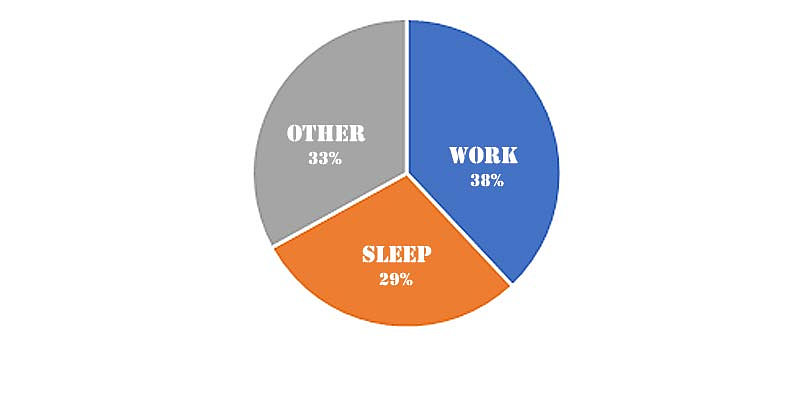If SHTF, 38% Chance You Will Be At Work

You probably spend about 38 percent of your time while at work, along with the typical commute. Assuming that you’re not retired. So if you’re one of the preparedness-minded (prepper lifestyle), you really should consider “what if” SHTF while you’re at work…
You spend 29 percent of your lifetime sleeping, if you sleep 7 hours a night.
33 percent of your time you’re doing other things, at home, etc..
So, if a SHTF event were to occur, there might be a ~38% chance that you will be at work.
For preparedness sake, this is a significant statistic.
Preparedness For If The Balloon Goes Up While At Work
Don’t ignore preparedness /prepping for while at your work place. You might be at work if and when “it” happens.
What do I mean by SHTF?
It’s a common acronym for shit-hit-the-fan. And it generally refers to anything whereby your world is disrupted to a significant degree. The reference is bandied about within the preparedness /prepper community, although opinions vary as to the threshold of disruption /disaster to justify using the term. I’ll leave the interpretation up to you. Point being, you spend a lot of time away from home, at work, and you ought to consider that for contingency planning.
If you are caught away from home in a SHTF situation the first 12 hours will be the most critical in developing a plan, gathering any additional supplies and getting away from populated areas. Once the reality of the situation sets in, the panic will begin and the unpredictability of normally rational people will skyrocket.
~ Romeo Charlie
I was at work when 9/11 happened. At that time I thought SHTF was starting. The boss decided to close for the day. I had my EDC in the car so I filled my water bottle at the water cooler. I remember my fellow workers standing around looking at me in shock not knowing what to do. Fortunately it wasn’t TEOTWAWKI.
~ said someone on the blog
Things you can do…
One of the most effective ways that you can prep for this is by having adequate kit/supplies in your vehicle (assuming that you drive to work). Your vehicle will be your storage location for whatever tangible assets that you decide to include in your contingency plans. A place for supplies, gear, food, water, etc..
If you don’t commute by way of your own vehicle, it will be even more important to supply yourself at the workplace itself, as well as considering your every-day-carry (on your person, a shoulder bag, briefcase, etc..).
As is the case for most tangible preparedness supply choices, you’re looking at the basics first. Like water and food. You’re at work. So there’s technically shelter. Maybe the power is out. Perhaps a flashlight. It’s part of my EDC on my keychain (I use this Olight 90 Lumen tiny flashlight) (amzn).
Your primary mission (if SHTF at work) will likely be to get home. If your vehicle is operational and the roads are passable, great. You will probably have little problem, at least if you ‘get out of dodge’ quickly enough. But what if you can’t (for whatever reason – it may impede driving home)?
A bag to carry your supplies which will help you get there if you have to hoof it?
Is it do-able to carry a folding bike in the trunk?
Walking shoes or hiking boots. Comfortable appropriate footwear in case you have to walk a great distance.
Are you always wearing appropriate seasonal outerwear when you go to work during the winter? People go from their heated homes to their heated cars to their heated workplace. As a result, the right seasonal gear might be overlooked… How many times have we seen lines of stranded vehicles on the highway in a snowstorm? Think about that.
A huge snowstorm came in one year and I called the boss and said we gotta go. She balked, but we left. She stayed. I got a call that night from her stating it took her 7 hrs. to make 20 miles. She said she’d never not listen again.
~ Matt in Oklahoma
Things to help keep warm. Blankets. Ways to start a fire.
[ Read: Fire Starting Kit List ]
Got a desk at work? Or a personal space, a locker, other? Why not use one of the drawers for emergency supplies. Like a bunch of Food Bars for quick food, for example.
[ Read: The CLIF Bar Energy Food Bar For Survival Kit ]
Keep several water bottles in there too. Is there a First Aid Kit there at work? Workplace buildings can get real dark if the power goes out. I consider a flashlight a must have too.
A change of clothes might be good – depending on your normal work attire.
From time to time I go through my truck and adjust what I keep in there for preparedness /prepping supplies. You should too!
Think about SHTF in the context of being at work. Maybe you’ll need to hunker down there for awhile (as opposed to immediately hoofing it back home). Maybe that will cause you to adjust your supplies.
Re-evaluate what you have, and make adjustments accordingly.
While those of you who are preparedness-minded probably have a decent supply of various preps at home, the point here is not to neglect your workplace. Especially since you spend so much time there, assuming you’re not already retired.
What else?
[ Read: Survival Gear For Preparedness | What You Need And Why ]
[ Read: Winter Survival Gear To Keep In Your Car ]
